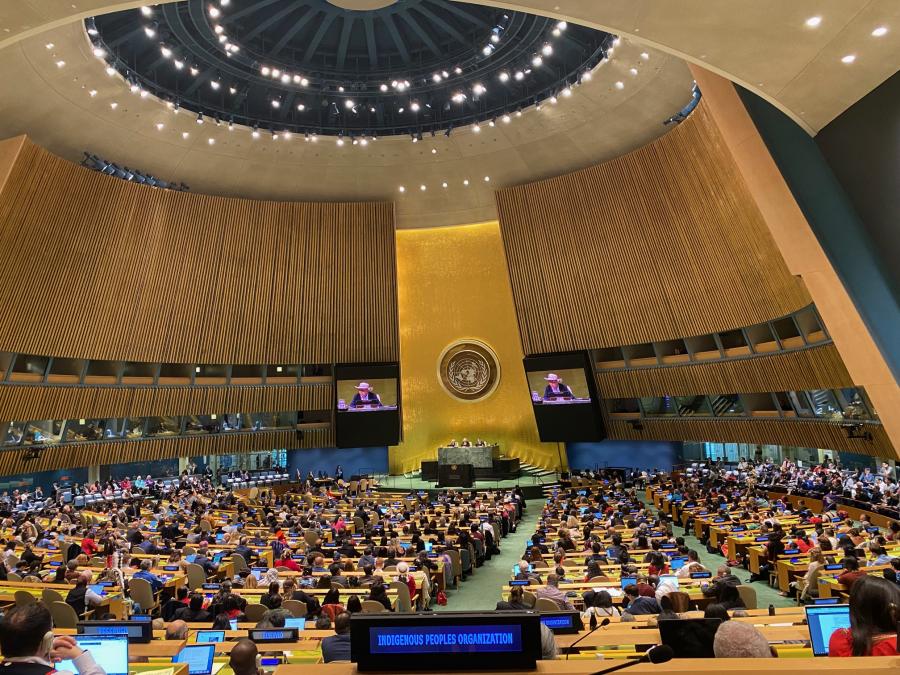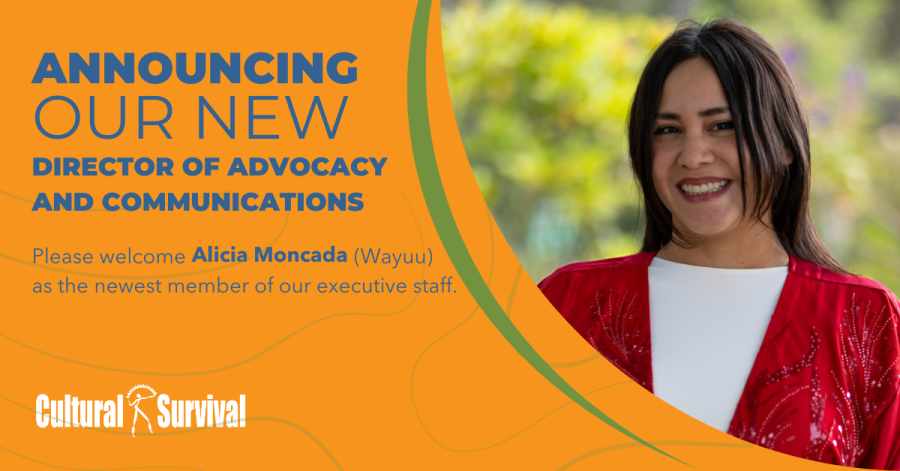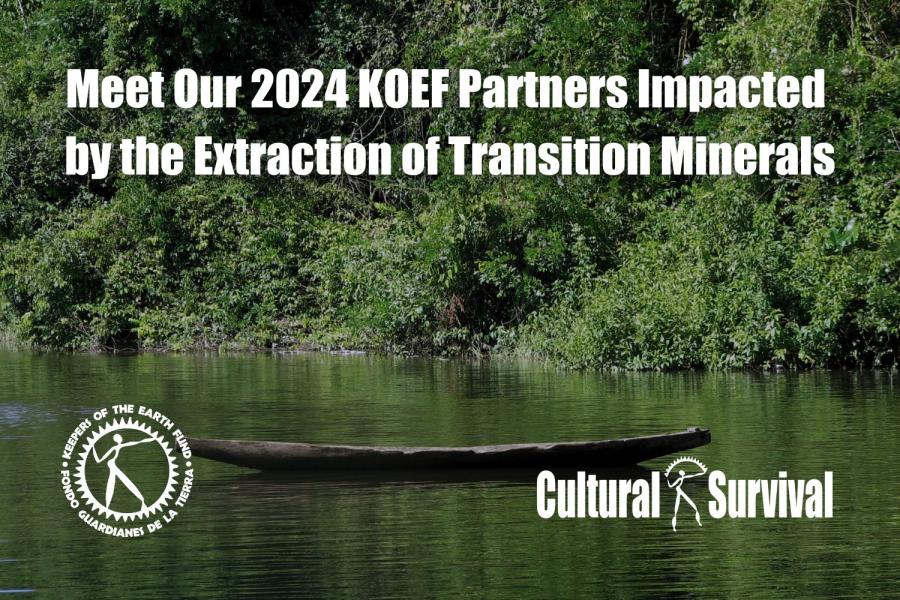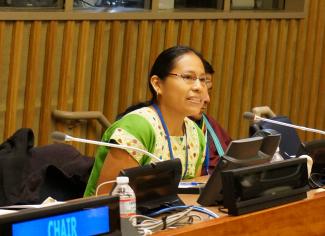
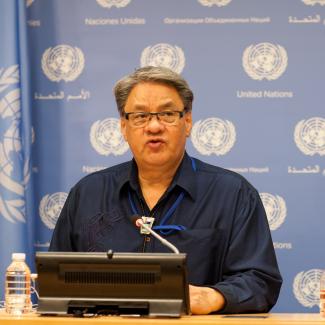
The following interviews were conducted with Indigenous leaders and activists from around the world in attendance at the Paris climate negotiations. We are thankful for their willingness to provide their perspectives.
Cristina Coc (Maya)
Maya Leaders Alliance Association (Belize)
My communities consist of 39 communities in southern Belize and we are primarily focused on issues of land tenure security. We are looking to our government to recognize and respect our rights to our customary lands that we use and occupy. Our communities are subsistence agriculture farmers, and because there is a lack of recognition, because there is no political will to protect and secure our customary lands, our government continuously grants development concessions that have immediate impacts on our livelihoods.
Being people of Mother Earth, we recognize that it’s integral to ensure that Indigenous Peoples’ traditional knowledge, our knowledge as Maya people, is considered important when we think of development. It’s these forests, it’s these lands that give us our sustenance, our way of life and that are essential for the survival of our future generations. It’s important to ensure that the voices and concerns of Indigenous Peoples, calling for the respect for the integrity of our natural world, be incorporated directly into the dialogues where it concerns climate change. We need the governments to understand the links between our rights and our customary land use as the pivotal part of dealing with climate change adaptations.
I’m very disappointed that Indigenous Peoples are not directly involved and do not have direct and easy access to come as observers into the main negotiation zone. And while that is a disappointment, I’m very happy that Indigenous Peoples have carved out a space for themselves here, right here where the negotiations are happening. Amongst ourselves we are able to highlight the concerns that directly affect our communities. The exchanges here with other Indigenous groups allow us to learn from them, to possibly adopt their solutions. We can also begin to create alliances and partnerships. I think that is one of the greatest functions of these kinds of conferences.
The next step for us is to continue to advocate for our rights as Indigenous Peoples, to build alliances. We have taken great steps forward. We now have legal recognition of our ancestral lands. We are looking towards the implementations of those historic court decisions in our favor. We hope that other Indigenous communities that have similar land claims can use this legal precedent to support their own land claims. We are looking forward to building sustainable economic development initiatives within our own communities. We cannot wait for states to do that for us. As Indigenous Peoples, we have begun to propose how it is we want to develop our lands and our natural resources in a way that does not threaten the value and the integrity of the Maya Cosmovision, that does not threaten our identity as Indigenous Peoples, and that does not degrade our environment that we so greatly depend on.
Perhaps one of the things that is seldom understood is that we are stewards of our natural world. We do not see the environment from a capitalistic worldview where it’s for us to take and make money out of it. We see it as an incubator that gives us life. Our survival depends on our not disrupting, not disrespecting, not ignoring the importance of Mother Earth. We truly believe that if these negotiations on climate change are to be successful, they need to recognize that Indigenous Peoples have already developed solutions and interactions with the environment that does not threaten it. We truly echo the voices of many here who are advocating for the traditional knowledge of Indigenous Peoples to be included when beginning to think of climate change mitigation and adaptation.
Chief Edward John (Akile Ch'oh)
First Nations Summit, British Colombia
In Western Canada, one of the big issues is the extensive gas and oil development through hundreds of kilometers of Indigenous territories for overseas markets. Every pipeline (there are up to 17 being proposed) will come through Dakelh territory. We have some big concerns about this. We need to ensure our food security. Our people still depend on our land and territories for food, fish, berries, plants, animals, and medicines, like our ancestors did. We still rely on these resources and we don’t want that jeopardized, compromised in any way whatsoever.
Another issue in the heart of this area of British Columbia is the extensive mountain pine beetle attack devastating huge areas of forests. Normally when temperatures reach about 40 below, it kills them off. But due to global warming, the winter temperatures have been so warm they have multiplied and their numbers have exploded. It has devastated pretty much all of the pine forests in the north of British Columbia. We all know about the great lungs of the earth, the Amazon basin. What people don’t know is the boreal forest in Canada is as large or bigger than the Amazon basin, where most of the attention is focused. We call it ‘the carbon no one talks about.’
On the west coast there are initiatives in place and others underway with Indigenous Peoples engaging in carbon credit activities. Instead of logging in their territory, they are raising revenues from the use of their forests for carbon offsets. It’s an example of something that Indigenous people directly participate in and which directly benefits them without destroying the forest or the ecosystem. In the Paris Agreement there are provisions for carbon pricing as a way forward. This will be part of the new economy into the future.
Following this conference in Paris there will be a meeting to develop a national plan to deal with climate change. The prime minister made that commitment here. He said in his speech to world leaders at the High Level plenary that Indigenous Peoples have been fighting to protect the environment for thousands of years, and it’s about time we joined them. That was for me a really good approach. We were able to influence that presentation. However, we have yet to develop the joint plans necessary going forward.
The Paris Agreement is an important step forward. But will the commitments and actions be deep enough to effect and mitigate the necessary changes of climate change, or will it simply delay the inevitable?
We have lobbied hard to have the views and rights of Indigenous Peoples factored into the discussions and the agreement. Much of the debate is focused on the roles and responsibilities between the so-called developed countries and the developing countries. I listened to the leaders from the developing countries. They need finances to support their climate change commitments and initiatives. But we Indigenous Peoples in developed countries find ourselves in the same position as the developing countries: we are at the bottom of the socioeconomic scale. We don’t have the financial resources for mitigation or adaptation for climate change work.
How do we rectify that? We do it through advancing our rights and exercising our responsibilities. You will see that in every one of our Indigenous communities, the first and foremost priority is to protect the environment. Article 25 of the UN Declaration on the Rights of Indigenous Peoples clearly spells out the ‘spiritual’ relationships that Indigenous Peoples have for and with the land and our responsibilities to future generations. The word ‘responsibility’ is on the flip side of ‘rights.’
As Indigenous Peoples with ‘observer status’ and without access to the main venue, we worked hard to be heard and seen at COP 21. Our key message was to ensure Indigenous Peoples’ rights were included in the purpose section of the Paris Agreement. It wasn’t. But it is in the Preamble. We will have to build on these utilizing other UN instruments, including the Vienna Convention, and we need to be proactive at the State and international levels to leverage the commitments made here in Paris.
Photo of Coc by Danielle DeLuca
Chief Edward John photo courtesy of UNPFII/Broddi Sigurdarson.
